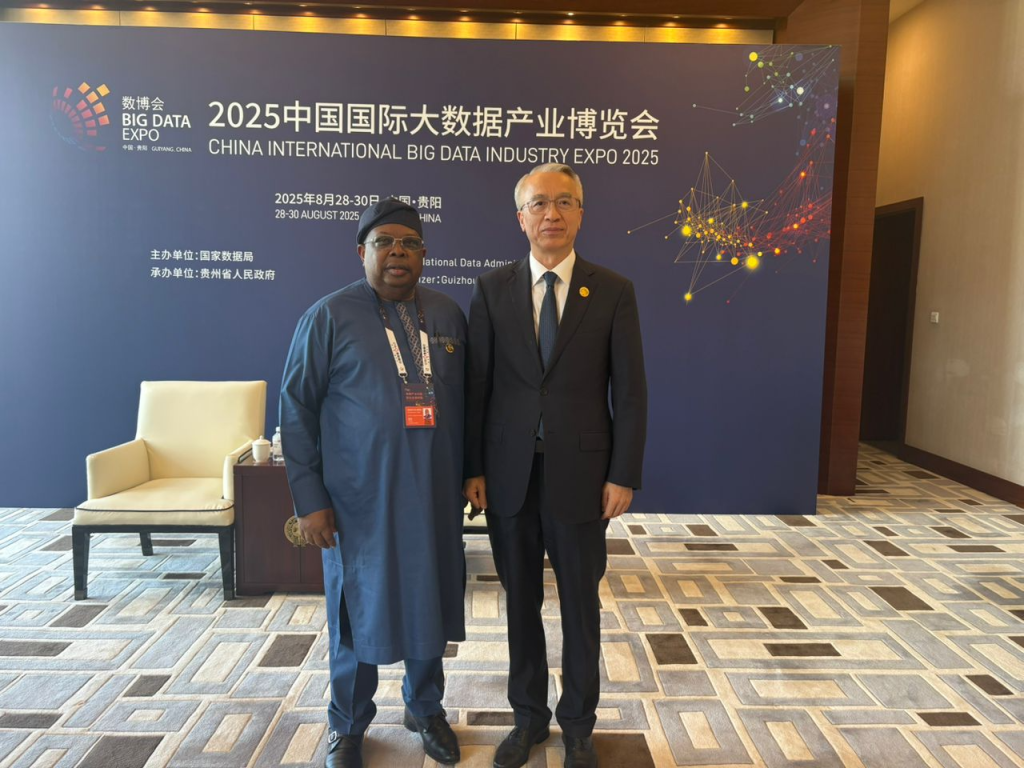817
Joy Agwunobi
Nigeria has intensified its drive to attract global technology investments, positioning itself as Africa’s next major digital hub, with projections showing that the country’s data centre market will more than double to $671 million by 2030 from its current value of $278 million.
Joseph Tegbe, director-general of the Nigeria-China Strategic Partnership (NCSP), made this disclosure during a series of high-profile engagements in Guiyang, China, where he presented Nigeria’s digital investment blueprint to leading Chinese technology firms.
Speaking at the China International Big Data Industry Expo, Tegbe highlighted Nigeria’s scale and potential, pointing to its 220 million-strong population—of which over 160 million are internet users—a thriving fintech ecosystem, and expanding fiber optic backbone. According to him, these fundamentals provide fertile ground for Nigeria to replicate elements of China’s digital transformation on African soil.
“Big data is not just a technical issue, but a strategic one—about converting intelligence into economic and social value,” Tegbe said. He added that Africa’s shortfall in digital infrastructure should be seen as a greenfield opportunity for investors. “We are urging Chinese technology leaders to be early movers in building Africa’s digital highways, with Nigeria as the anchor,” he pointed out.
At the Digital Silk Road Connection Event, Tegbe provided further clarity on Nigeria’s roadmap, stressing that the projected $671 million market growth by 2030 is underpinned by Africa’s broader digital surge, with internet penetration surpassing 570 million users and mobile traffic expanding at 40 percent annually.

Tegbe further outlined four priority areas for Nigeria–China cooperation under the Belt and Road Initiative’s Digital Silk Road framework. First, he stressed the importance of developing hyperscale data centres and cloud availability zones, which he described as the backbone of Africa’s future digital economy. He also called for the diversification of global AI supply chains by integrating African datasets and talent, a step he said would help build more inclusive technology ecosystems.
A third focus, according to him, is the creation of joint research laboratories across key sectors such as agriculture, healthcare, and financial services, ensuring that local data is applied in solving local challenges. Finally, he underscored the need to expand talent pipelines through research and exchange programmes that would align Africa’s growing digital capacity with Chinese expertise.
Tegbe tied these proposals to the African Continental Free Trade Area (AfCFTA), stressing that the 1.4 billion-person integrated market presents an unprecedented opening for forward-looking investors. “The countries that will thrive in the modern economy are not those with the most minerals, but those who can harness data for their people,” he said, framing Nigeria as the launchpad for Africa’s digital revolution.
Beyond investment prospects, Tegbe reaffirmed Nigeria’s support for the One-China principle and praised Chinese companies’ longstanding role in Nigeria’s economic development. He cited firms such as Huawei, ZTE, CCCC, CRCC, CCECC, and CHEC as examples of partners whose existing footprints in infrastructure and technology positioned them well to drive the next phase of collaboration.
“The world is entering a new era where data is the new oil,” Tegbe declared. “If we align China’s expertise with Nigeria’s innovation and Africa’s vast markets, we can create new Silk Roads of digital opportunity. Nigeria is ready. Africa is ready. Together with China, we can shape the digital destiny of tomorrow.”





